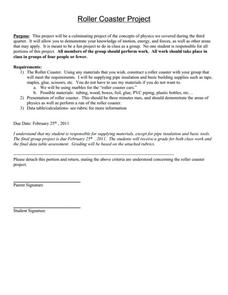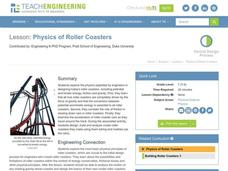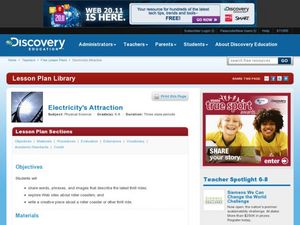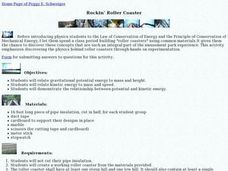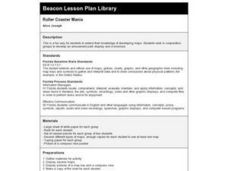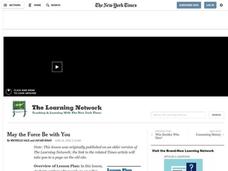Curated OER
Physics of Roller Coasters
Students design a roller coaster and demonstrate their knowledge of Potential and Kinetic Energy. They determine the average velocity a given marble travels on their roller coaster and apply their knowledge of various measurement systems...
CK-12 Foundation
Roller Coaster
Roller coasters rely on both kinetic and potential energy, but how much total energy does a roller coaster need? Scholars vary the mass of a coaster and the height of the initial hill. Graphs showing the types of energy and total energy...
MENSA Education & Research Foundation
Roller Coaster Mania!
Raise the energy level of your physical science class with this exciting hands-on activity. Applying their knowledge of kinetic and potential energy and Newton's laws of motion, young engineers use foam tubing and marbles to create...
DiscoverE
Build a Roller Coaster
Let the good times roll as young thrill seekers build a roller coaster on school grounds. Future engineers design and build a roller coaster from flexible tubing. The roller coaster is for a marble, so there will be plenty of room to let...
Curated OER
Take a Roller Coaster Ride
Students investigate how roller coasters are built. In this physics lesson, students research the laws of physics that affect roller coaster construction. Students create their own roller coaster design.
Curated OER
Roller Coasters
Twisting and turning through the sky, roller coasters are popular attractions at amusement parks around the world, but how exactly do they work? Explore the physics behind these thrilling rides with an engineering design activity....
Curated OER
Tubularastic Roller Coaster
Students observe the effect of gravity on objects. They use tubing and other materials to simulate a roller caster. Afterward, they create a journal to write their observations and summaries.
Curated OER
The Ultimate Roller Coaster Contest
Young scholars explain how conservation of energy applies to roller coasters. In this physics lesson, students construct their own coasters according to a specified criteria. They make modifications to their design when necessary.
Anchorage School District
Roller Coaster Project
Emerging engineers work in teams to design pipe insulation roller coasters for marbles that meet specific parameters. They are required to label along the track the areas where kinetic and potential energy are highest and lowest, where...
Kenan Fellows
Engineering Skills Through Problem Based Learning
Navigate the ups and downs of learning about energy. Future engineers consider how potential and kinetic energy apply to roller coasters. They design a roller coaster of their own and then use computer design software to showcase their...
Teach Engineering
Amusement Park Ride: The Ups and Downs in Design
Groups design the ultimate roller coaster by considering potential and kinetic energy. They test their designs using marbles and then go on to rate each group's design based on aesthetics, loop diameter, and cost.
Curated OER
Roller Coaster Simulator for the Magnetic Chalkboard: Construction Plans
Pupils watch a demonstration that allows the teacher to show Galileo's inertia experiment and how and why the hills on roller coasters are designed as they are. The roller coaster simulator can be mounted on a magnetic chalkboard;...
Curated OER
Building a Roller Coaster
Students describe the law of conservation of energy. They identify the conversion between potential and kinetic energy. They investigate and describe the application of Newton's Laws of Motion.
Curated OER
Mathematical Modeling and Physics
Twelfth graders use a web site to investigate roller coaster physics. In this mathematical modeling lesson, 12th graders are grouped according to their performance on a test. Each group is given an activity to complete on a web site...
Curated OER
Physics of Roller Coasters
Learners study the physics used to design today's roller coasters. For this engineering lesson students complete several activities including designing their own roller coaster.
Curated OER
Design Your Own Rollercoaster
Here is a physics lesson that your 5th graders should love. They explore the physics behind roller coasters by viewing roller coaster simulations online. Then, they work in pairs in order to design their own roller coasters and track....
Curated OER
Electricity's Attraction
Learners explore the different features of a roller coaster using an interactive website. In this physical science lesson, students explain the role of science to make this thrill ride possible. They develop a creative presentation about...
Curated OER
Roller Coaster Physics
Students design a roller coaster that allows a marble to run the course as fast as possible. Students create an experimental roller coaster taking into account the steepness of the hills and the sharpness of the turns. Students use a...
CK-12 Foundation
Loop-the-Loop
What prevents a roller coaster from falling when it goes upside down? Scholars experiment with a roller coaster simulation controlling the mass of the coaster, the height of the hill, and the radius of the loop. They learn which factors...
CK-12 Foundation
Energy Conservation Simulation
Does the amount of a roller coaster's energy change as it goes along the track? Scholars investigate when a roller coaster has potential and kinetic energy. They observe the changes as it goes up the initial hill follows it throughout...
Alabama Learning Exchange
This Is How We Roll!
Students research how roller coasters work. In this physics lesson, learners research the history of roller coasters and the safety factors in the design of a roller coaster on the website www.learner.org/exhibits/parkphysics. They...
Curated OER
Rockin Roller Coaster
Students discuss gravitational potential energy, kinetic energy, and the relationship between potential and kinetic energy. They create a working roller coaster from provided materials and criteria then evaluate each roller coaster. They...
Curated OER
Roller Coaster Mania
Fifth graders extend their knowledge of developing maps. They work in cooperative groups to develop an amusement park display and a brochure.
Curated OER
May the Force Be With You
Students read an article, brainstorm ideas and prepare journals investigating why people enjoy 'thrill' rides, what forces affect the body on these rides and how they can become dangerous.










